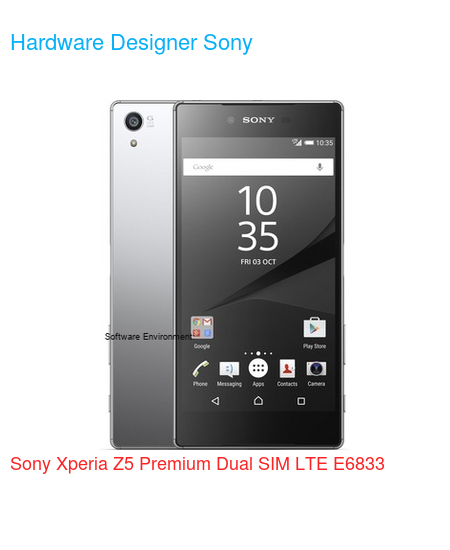| Brand | Sony |
| Model | Xperia Z5 Premium Dual SIM LTE E6833 |
| Released | 2015 Nov |
| Hardware Designer | Sony |
| Manufacturer | Sony |
| Codename | Sony Satsuki DS |
| OEM ID | PM-0912-BV |
| General Extras | Haptic touch feedback |
| Device Category | Smartphone |
| Width | 75.8 mm |
| Height | 154.4 mm |
| Depth | 7.8 mm |
| Dimensions | 2.98×6.08×0.31 inches |
| Mass | 180 g |
| Platform | Android |
| Operating System | Google Android 5.1.1 (Lollipop) |
| CPU Clock | 1958.4 MHz |
| CPU | Qualcomm Snapdragon 810 MSM8994 v2.1, 2015, 64 bit, octa-core, 4096 Kbyte L2, 20 nm, Qualcomm Adreno 430 GPU |
| RAM Type | LPDDR4 SDRAM |
| RAM Capacity (converted) | 3 GiB RAM |
| Non-volatile Memory Interface | Yes |
| Non-volatile Memory Capacity (converted) | 32 GB ROM |
| Display Diagonal | 138.9 mm |
| Resolution | 2160×3840 |
| Horizontal Full Bezel Width | 7.7 mm |
| Display Area Utilization | 70.4% |
| Pixel Density | 806 PPI |
| Display Type | Color IPS TFT LCD display |
| Number of Display Scales | 16.8M |
| Scratch Resistant Screen | DragonTrail X |
| Graphical Controller | Qualcomm Adreno 430 |
| Dedicated Graphics Memory | 1.5 MiB |
| A/V Out | MHL 3.0 |
| Microphone(s) | stereo |
| Loudspeaker(s): | stereo |
| Audio Output: | 3.5mm |
| Supported Cellular Bands | GSM850 , GSM900 , GSM1800 , GSM1900 , UMTS2100 (B1) , UMTS1900 (B2) , UMTS1700/2100 (B4) , UMTS850 (B5) , UMTS900 (B8) , LTE2100 (B1) , LTE1900 (B2) , LTE1800 (B3) , LTE1700/2100 (B4) , LTE850 (B5) , LTE2600 (B7) , LTE900 (B8) , LTE700 (B12) , LTE700 (B17) , LTE800 (B20) bands |
| Supported Cellular Data Links | GPRS , EDGE , UMTS , HSUPA , HSUPA 5.8 , HSDPA , HSPA+ 21.1 , HSPA+ 42.2 , LTE , LTE 150/50 data links |
| SIM Card Slot | Nano-SIM (4FF) |
| Complementary Phone Services | Voice transmission , Voice speaker , Vibrate , Speakerphone , ANC |
| Dual Cellular Network Operation | Dual standby |
| Sec. Supported Cellular Networks: | GSM850 , GSM900 , GSM1800 , GSM1900 |
| Sec. Supported Cellular Data Links: | GPRS , EDGE |
| Sec. SIM Card Slot | Nano-SIM (4FF) |
| Touchscreen Type | Capacitive multi-touch screen |
| Expansion Interfaces | TransFlash , microSD , microSDHC , microSDXC |
| USB | USB 2.0 |
| USB Services | USB charging , USB fast charging , USB Host , USB OTG 1.3 , USB PD |
| USB Connector | USB Micro-AB |
| Bluetooth | Bluetooth 4.1 |
| Wireless LAN | 802.11a , 802.11b , 802.11g , 802.11n , 802.11ac |
| Wireless Services | DLNA , Miracast , Wi-Fi Direct |
| NFC | Yes |
| FM Radio Receiver | FM radio (76-108 MHz) with RDS |
| Complementary Satellite Services | Simultaneous GPS , A-GPS , Geotagging , QuickGPS |
| Supported GLONASS protocol(s) | L1OF |
| Camera Placement | Rear |
| Camera Image Sensor | BSI CMOS |
| Number of effective pixels | 22.9 MP camera |
| Aperture (W) | f/2.00 |
| Zoom | 1.0 x optical zoom |
| Focus | CD AF , PD AF |
| Min. Equiv. Focal Length | 24 mm |
| Video Recording | 3840×2160 pixel |
| Flash | single LED |
| Camera Extra Functions | EIS , HDR photo , HDR video , Macro mode , Panorama Photo , Smile detection , 3D Panorama Photo |
| Aux. Camera Image Sensor | No |
| Aux. 2 Camera Image Sensor | No |
| Aux. 3 Camera Image Sensor | No |
| Aux. 4 Camera Image Sensor | No |
| Secondary Camera Placement | Front |
| Secondary Camera Sensor | CMOS |
| Secondary Camera Number of pixels | 5.0 MP sec. cam |
| Secondary Video Recording | 1920×1080 pixel |
| Sec. Aux. Cam. Image Sensor | No |
| Built-in compass | Yes |
| Built-in accelerometer | Yes |
| Built-in gyroscope | Yes |
| Additional sensors | Barometer , FP sensor , Hall , L sensor , P sensor |
| Protection from solid materials | 6 Totally protected from dust |
| Protection from liquids | 8 Protected against immersion beyond 1m of depth |
| Battery | Li-ion polymer (LiPo) |
| Nominal Battery Capacity | 3430 mAh battery |
| Market Countries | Belgium , Czech , Denmark , France , Germany , Hungary , Italy , Netherlands , Portugal , Romania , Russia , Slovakia , Spain , Sweden , UK |
| Market Regions | Eastern Europe , Europe , Western Europe |
| Mobile Operator | T-Mobile United Kingdom |
| Added | 2024-06-23 |
Specifications data description of this 📱Sony Xperia Z5 Premium Dual SIM LTE E6833📱
Title: The Ultimate Specification Guide for Your Devices: From Network to Battery 🌐📅🏋️🌈🤖🛠️🚀🔧💪🖥️🎮🗂️📷🎥🔈📡📶💡💎🔋🔌
Introduction:
Welcome, tech enthusiasts! In this blog post, we will delve into the fascinating world of device specifications. From network capabilities to battery life, we’ve got you covered. So, buckle up and get ready for an exciting journey through the specs that make your devices tick! 🚀
Lineup:
Our device specifications overview will consist of the following categories:
🌐 NETWORK: Connectivity features
📅 LAUNCH: Introduction date
🏋️ BODY: Dimensions and weight
🌈 DISPLAY: Screen specifications
🤖 OS: Operating system info
🛠️ CHIPSET: Processor details
🚀 CPU: Central Processing Unit features
🔧 GPU: Graphics Processing Unit specs
🧠 MEMORY: Storage and RAM details
📷 CAMERA: Photography and videography capabilities
🔈 SOUND: Audio components
📡 COMMS: Communication features
📶 CONNECTIVITY: Wireless technologies
💡 FEATURES: Additional functionalities
🔋 BATTERY: Power source details
🔌: Charging information
Design:
Devices are more than just their specs; their design also plays a significant role. The dimensions and weight, as well as the materials used, impact not only the device’s appearance but also its ergonomics and durability.
Specifications:
As for the nitty-gritty, here are the specs categories:
🌐 NETWORK: Connectivity technology, including data speed, Wi-Fi standards, Bluetooth, GPS, and more.
📅 LAUNCH: Global availability of the device.
🏋️ BODY: Dimensions, weight, build materials, and other design aspects.
🌈 DISPLAY: Screen resolution, refresh rate, HDR, and other display-related details.
🤖 OS: Operating system name, version, and UI information.
🛠️ CHIPSET: The processor name, manufacturer, clock speed, and architectural details.
🚀 CPU: CPU cores, threads, and other processor-related data.
🔧 GPU: GPU model, performance, and other graphics-related information.
🧠 MEMORY: RAM capacity and storage specifications.
📷 CAMERA: Camera specs, including resolution, aperture, sensor size, and video recording capabilities.
🔈 SOUND: Audio system details, such as audio codec support and speaker specifications.
📡 COMMS: All available communication channels and standards.
📶 CONNECTIVITY: Connectivity features, such as USB, headphone jack, NFC, and other related capabilities.
💡 FEATURES: Additional device functionality and features.
🔋 BATTERY: Battery capacity and charging specifics.
🔌: Charging technology and capabilities.
Conclusion:
In conclusion, these device specifications provide a comprehensive perspective on the device’s capabilities and limitations. Understanding these specs can help you make informed choices while purchasing and enable you to utilize your devices more efficiently.
But hey, we’re not done yet! We’d love to hear your thoughts and suggestions.
Did we miss an important specification? Or perhaps you’d like to see more posts like this? Whatever it is, let us know in the comments below! 🗣️💬














